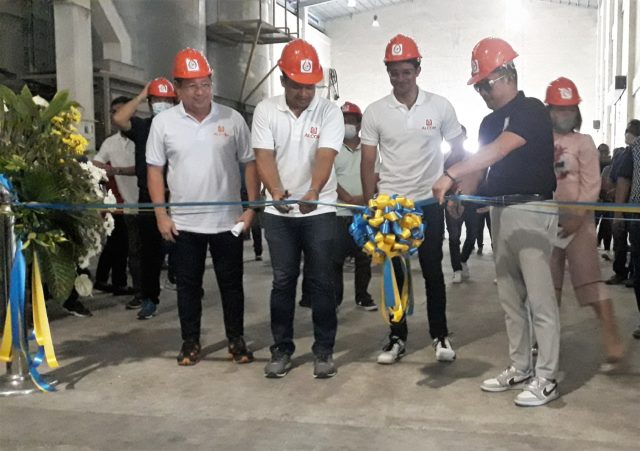Gov. Aurelio Umali (right) leads the ribbon cutting along with Prateek Tiwari (left) of Alcom Pte for biochar production in a provincial grain drying facility. Photo by Armand Galang
PALAYAN CITY — A Singaporean renewable energy company has forged a joint venture agreement with the provincial government of Nueva Ecija for the production of soil enhancement materials out of rice husks amid the skyrocketing prices of fuel and fertilizers.
Gov. Aurelio Umali led Monday the inauguration at the grain drying facility here
of the “NuevaChar,” a Philippine Biochar project, along with Prateek Tiwari, founder and managing director of Alcom Pte Ltd.
Umali said that the project that emanated from Alcom’s unsolicited proposal is another big leap towards helping farmers who have been receiving support from the provincial government through its palay procurement program.
When the price of palay went down, Umali said, Nueva Ecija became the first LGU to have put up a provincial food council. “As a matter of fact, even the national leadership has commended in many occasions the initiative of Nueva Ecija,” he said.
Umali found Alcom’s proposal to convert rice husks to biochar as a way to help addressing various concerns, including environmental protection, preservation and taking care of nature and resources for the forthcoming generations.
Tiwari explained that biochar serves as supplement to enhance the soil productivity to increase yield in crops with reduced requirement on fertilizer.
“What we are doing in biochar is actually improving the quality of the soil in which you harvest,” he said.
The technology while being piloted in Nueva Ecija, being known as rice granary of the Philippines, has been successful in other countries.
Biochar, according to Alcom’s literature, is a high-carbon form of charcoal that is produced by heating organic matter at extremely high temperature and in the absence of oxygen. The process is called pyrolysis.
Organic matter usually included wood and agricultural byproducts like palm shells, coco, rice husks/straw, and bamboo as well as manure, Tiwari said. But they decided to concentrate on rice husks since these byproducts have the least use in the local setting, he explained.





